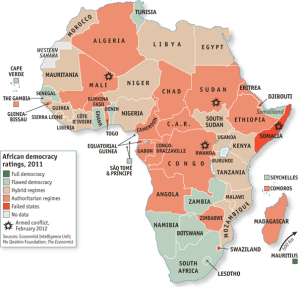When I blogged on the importance of elections a number of you challenged me on that and raised the question of the economics and culture. Setting aside the quality of African democracy, in relationship to elections one ought to consider the political, economic and cultural history of Africa’s dilemma with democratic rule. And as rightfully so questions were raised whether Africa had a viable alternative to democracy and whether Africa needs it, hence where did Africa go wrong.
I look at democracy as encompassing the economics and politics and culture. Democracy is a quintessentially contested issue as it is evident from the responses. How democracy is understood and interpreted is an issue that is up for intense discussion and I will leave it for your own conclusions. To me I see democracy as a culture and culture is a receptor in which different elements or variables such as the form of government people want can be plugged, and that does not mean that the variables will work. Africa’s tragedy as it relates with democracy starts right at its independence from colonial rule.
Present day African States at some point in time were empires, kingdoms and chiefdoms that had their traditional political, economic and social structures that made them independent and autonomous. However on the eve of independence of African countries from their colonizers these traditional structures or institutions were deemed archaic and seen as obstacles to the newly independent nation-states. As a result wrangling between various ethnic groups and allied interests over the fate of the newly independent states in the post colonial order produced various regimes on the continent from Authoritarianism, Military Rule, Neopatrimonialism, and “Big Men” regimes of the likes of Gnassingbe Eyadema – Togo, Idi Amin Dada – Uganda, Jean-Bedel Bokassa – CAR and Mobutu Sese Seko – [Zaire] Congo and the list goes during the 1960’s, 70’s and 80’s and now to illegal electoral democracies and so-called hybrids.
It should be noted that these entities prior to their dismantling had political, economic and social administrative power to govern. They had their own courts, ability to collect tax from their people and deep ethnic cleavages that provided legitimacy for the kings and chiefs to govern. In the new modern state kingships were regulated to cultural figure heads without political, economic and administrative power. After four decades of post colonial governance in Africa as the map below from the Economist indicates most of the African countries are weak nation states.
The implication being that if you’re a kin observer of history it should not take long to realize that culture is and should be part of Africa’s ideological dispensation. Culture is a receptor in which different elements of various political and economic ideologies can germinate and each and every culture has one, although to the eye of a common observer this may not be apparent. Culture accepts or rejects given aspects of political and economic ideologies.
The failure of earlier leaders and yes to a certain extent we; to look at kingdoms or culture as a means of addressing the political, economic challenges of African solely lie on our feet. Basically we started from scratch in building institutions in Africa yet we had kingdoms and due to their long traditions already had a culture that had habits and practices or political culture that current institutions lack.
In the end Tradition and Modernity are not antithetical to each other and we should be ready to use these institutions that the common man identifies with to curve out an African Ideology that at its core meets the developmental needs of the nation-state and must work for working families. Otherwise the experiment of nation-state so far as proven to be a challenge because it hasn’t delivered on its promise. In fact Thabo Mbeki’s Letter on the need for an African Renaissance at its core speaks of an African Ideological dispensation deep rooted in our culture that yes recognizes the progress made in modern times but also looks at how our cultural heritage can be used to spur growth and development and also protect those gains if any.

